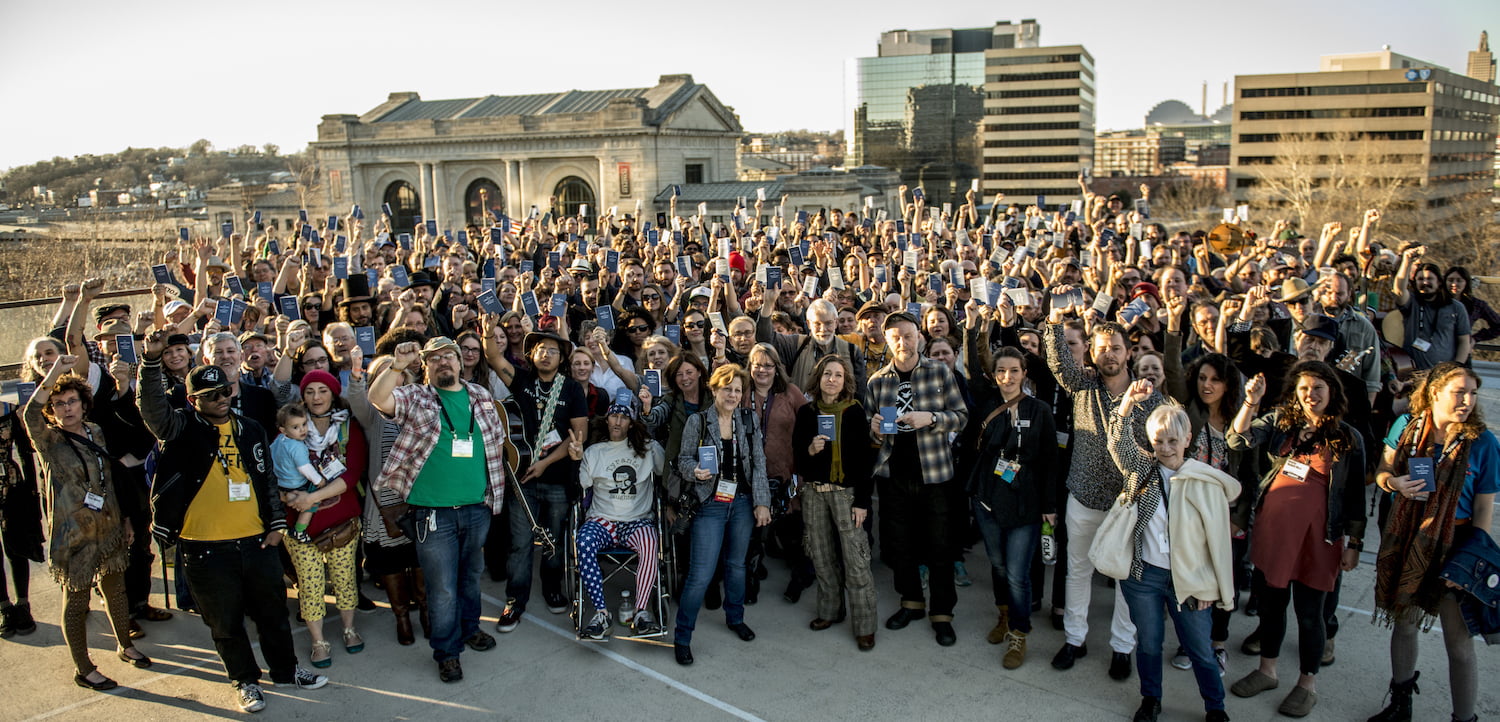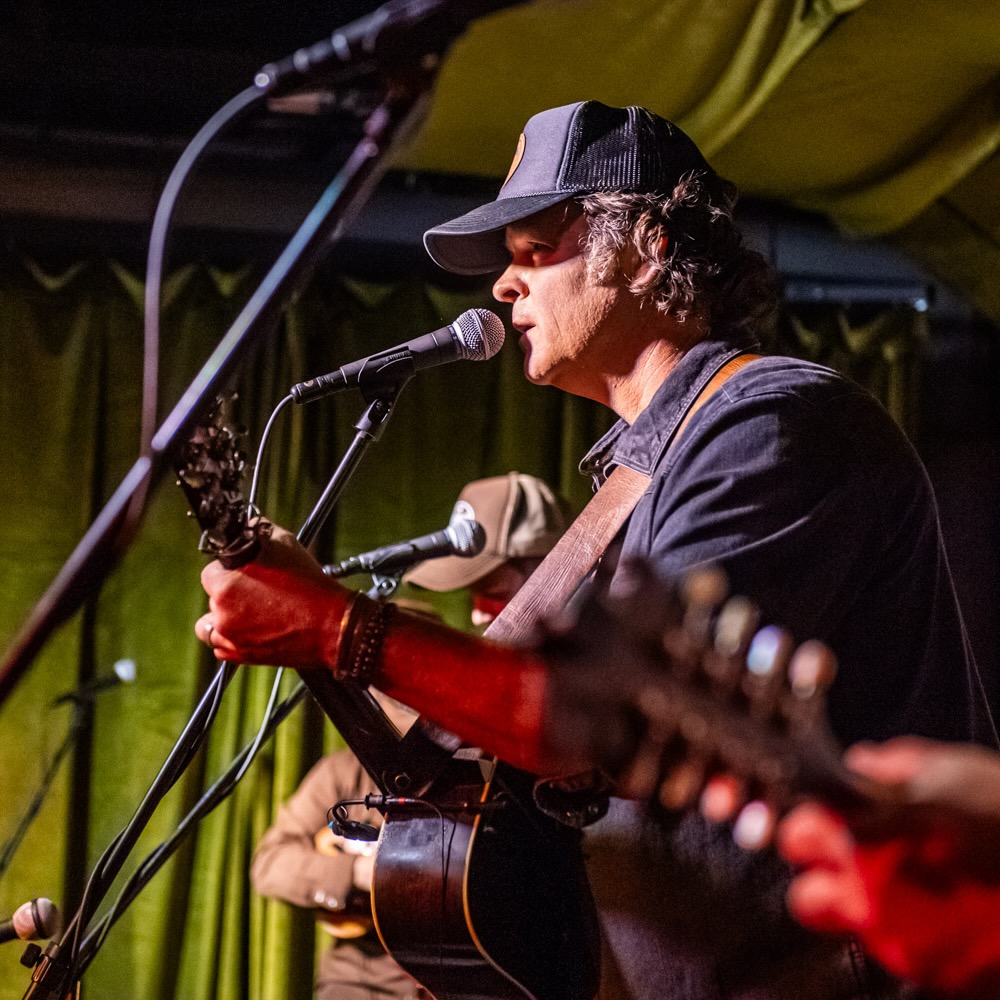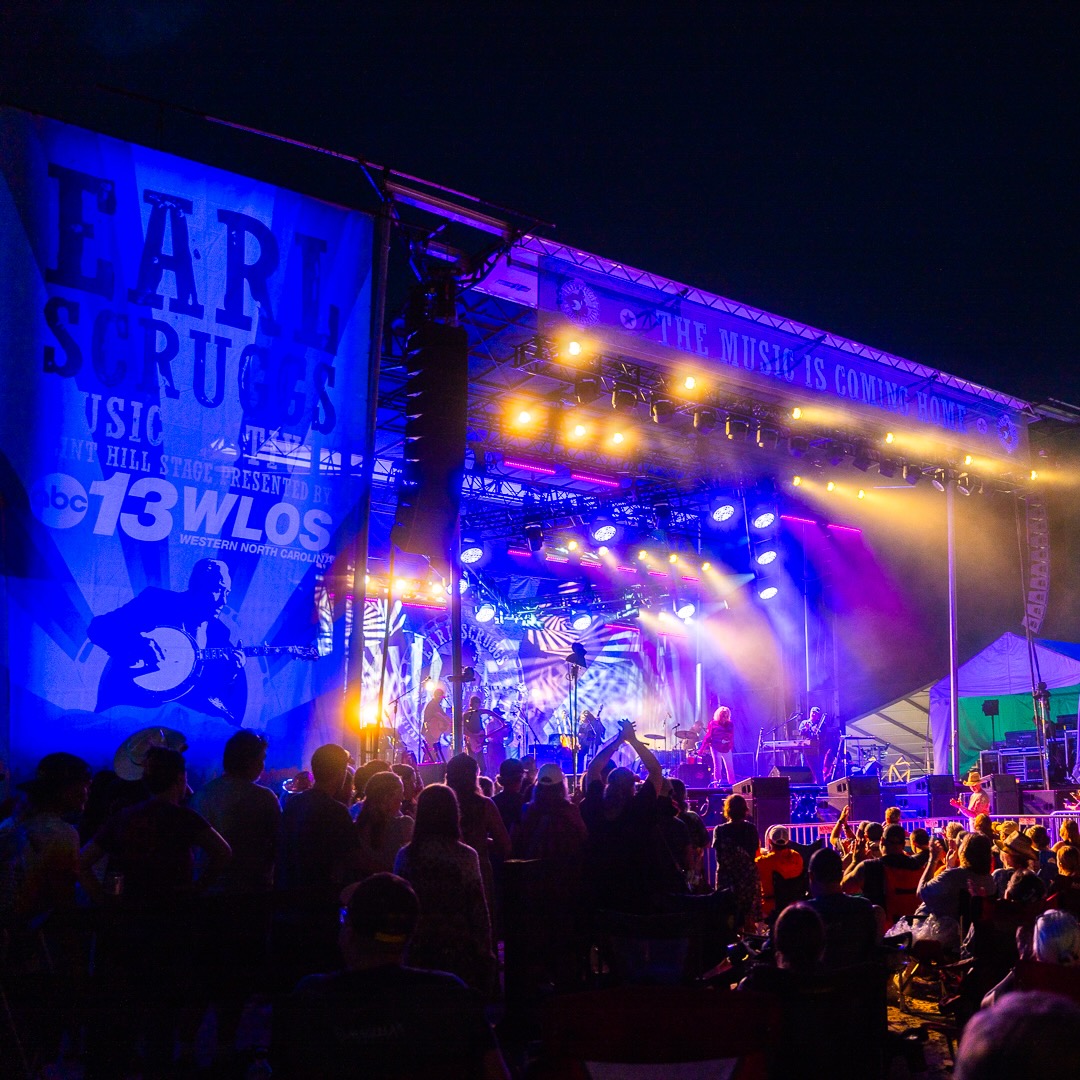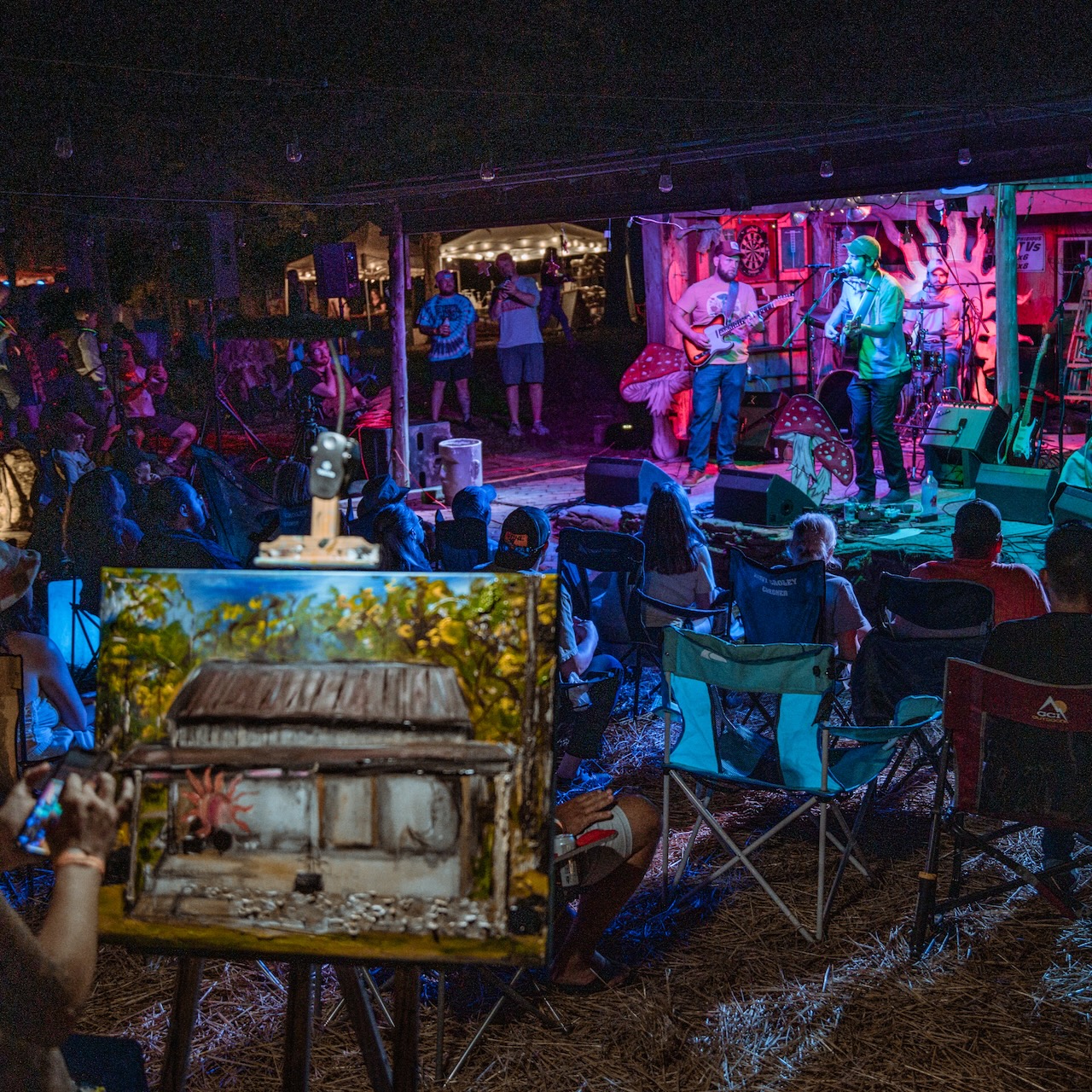Of the three big roots music conferences — World of Bluegrass, AmericanaFest, and Folk Alliance International — Folk Alliance demands the most mental musical bandwidth. More than 1,000 musicians were on hand in Kansas City, Missouri, between February 15 and 19, organizing themselves into more than 3,000 individual showcases, designated either “official” (jury-selected for the hotel meeting and ball rooms) or “private” (hosted by labels or other groups in the rooms and suites of the fifth through the seventh floor between 11 pm and about four in the morning).
Folk Alliance may have the biggest stylistic tent in the field, as well. It’s an explosion of variety-spanning established folk forms from around the world and some pretty heady fusion. The organization has wrestled in years past over musical orthodoxy and come out the other side as perhaps the most diverse and inclusive of the roots music frameworks, even if that comes with some trade-offs in careful curation. Still, there was more great music than one person could possibly hear, so I approached it with curiosity and excitement, as well as an inevitable sense of inadequacy to the task.
I checked one important Folk Alliance artist off my list before leaving for Folk Alliance by catching Austin fiddler/singer Phoebe Hunt and the Gatherers at Nashville’s Basement early in the week. She is back with a refreshed take on the bluegrass/gypsy jazz that distinguished her first band, the Belleville Outfit. Travels in India and study with an Indian violin master have injected a microtonal raga sensibility into her songs, which are arranged with great subtlety for a six-piece band.
Turning to Kansas City, I arrived too late for the Wednesday night awards show, where Bruce Cockburn accepted a People’s Voice Award from Kris Kristofferson and where Michael Kiwanuka, Sarah Jarosz, and Parker Millsap received (in absentia) “of the year” prizes for song, album, and artist, respectively. But Thursday evening, I plunged into FAI’s swift river of music.
Chicago’s wise and funny Susan Werner offered new songs inspired by a trip to Cuba. Nearby, Australian all-female quartet All Our Exes Live In Texas showed resourceful stagecraft, keeping the audience entertained during a PA outage. When the sound returned, they cooed with quirky chord changes and an urbane mix of accordion, mandolin, uke, and acoustic guitar. And Kayln Fay, a Cherokee country rocker from Tulsa, Oklahoma, led a band formed around understated drumming and washy steel guitar. Fay, an endearing singer, offered a lot to think about and closed her set with a brand new “protest song” that was actually more like a plea for better listening and more understanding.
From the Midwest to Coal Country I went, for a set by rising Appalachian star Sam Gleaves. So tall he almost bumped the ceiling in the Brookside Room, he had a boyish look, longish hair, and a sweet disposition. Performing with the support of duo Cathy Fink and Marcy Marxer, he bravely and bluntly sang about being a gay hillbilly from rural Kentucky. Folk hero Tom Paxton was in the audience and could be heard gushing post-performance.
Upstairs in the private showcase halls (the most poster-festooned place I’ve ever been), Music City’s Wild Ponies previewed new music from an upcoming album cut entirely in a rustic Tennessee farmhouse. Married couple Doug and Telisha Williams play guitar and bass, respectively. He’s got country power and she’s got a sort of brassy refinement. Their song “The Tower” about a mighty tree’s long lifespan just floored me. I wrapped the night with beautiful Spanish-language songs of lament and protest by Brooklyn’s Ani Cordero in the Bloodshot Records room.
Somebody took great care with the audio systems for the official showcases, from small to large. And, on Friday night in the main ballroom, Peter Bradley Adams and his tasteful three-piece band sounded like God’s hi-fi. It helps that the artist has a dreamy silk-and-sand voice and a penchant for Celtic folk-rock vibes blended wtih a modern pop feel. He was joined for a song or two by Caitlin Canty who followed his set with a moody folk-pop performance of her own. Her energetic and melodic debut album impressed me in 2015 and, based on this live impression, she ought to be a thing with anyone who ever loved Sheryl Crow or Alison Krauss.
Way up the elevator in the 20th floor club with fabulous views of downtown Kansas City, British rock ‘n’ roll cat Robyn Hitchcock showed off some of the solo acoustic sound he’s been cultivating during his recent years living in Nashville. He’s a finger-picking balladeer who’s been challenging the status quo for a long time, evidenced by his 1989 song “Queen Elvis” with its lyric “coming out’s the hardest part.” He told the crowd after singing that one, “I never dreamed we’d be dealing with the same old homophobic shit, 30 years later.”
At Folk Alliance, one can almost, at any time, seek out and plunge into old-time sounds, and my urge toward same led me to Molsky’s Mountain Drifters, led by fiddling icon and educator Bruce Molsky. He adapted FAI keynote speaker Billy Bragg’s “Between the Wars” to an old-time dirge and excelled on the old mining song “Black Hills.” Rounding out the clockwork trio was brilliant clawhammer banjo picker Allison de Groot and flattop guitar player Stash Wyslouch, about whom there will be more to say later.
That segued right into one of the most refreshing sets I saw all week. Laura Cortese and the Dance Cards of Cambridge, Massachusetts, head-faked me into thinking they would be a swingy retro quartet, when in fact they’re out there on the searching edge of chamber folk and minimalist pulse grass. From the risk of opening with an emotional four-way harmony ballad to the serene beauty of “California Is Calling” (the title track to an upcoming album that’s been featured on the Bluegrass Situation), their close and complex harmonies and imaginative arrangements signified the best of folk right now.
It came as no surprise that John Fullbright was astounding in the big ballroom. “Where my Okies at?” he asked from the stage as part of his very funny banter. His songs peel the skin right off of the truth, which means sometimes revealing sweet fruit underneath and sometimes a painful scraping. “Social Skills” was blistering and self-effacing. “All the Time in the World” is a rambling, witty meditation with a hard country-blues backing. Fullbright’s remarkable harmonica solos would have been difficult for someone who wasn’t playing guitar at the same time, yet he was.
Upstairs, my favorite stumbles of the night led me to a sophisticated jazz/grass fusion set by Nashville’s Frazier Band, featuring a hip rhythm section with electric bass and keys. Leader John Frazier plays the fire out of the mandolin and sings with echoes of John Cowan, the voice of the New Grass Revival. And then I made my way with purpose to see the Lonesome Ace Stringband from Toronto. I became a fan of fiddler/singer John Showman when he led the defunct New Country Rehab. Now he’s focused on this exciting old-time band — one that surges and pulses with that perfect push-pull feeling. They covered “Hills of Mexico” and a surreal Mississippi John Hurt song, but also offered Showman’s original “Pretty Boy Floyd,” an alterative take on Woody Guthrie’s magisterial ballad.
On Saturday night, Showman took his fiddle downstairs and joined Nashville’s Matt Haeck on stage for a set of vibrant songs that included the uncomfortably true line “All the world’s watching America; America’s watching TV.” Later, Haeck lent a Marty Robbins vibe to a duo with the wonderful Tim Easton. Staying on in this room proved smart because William Prince brought his insightful and deeply traditional country songwriting from Winnepeg. He’s absolutely magnetic, with a burnished pewter voice that could stand up to Keith Whitley’s on the radio. Prince is baby-faced and almost uncannily kind and gentle, but his songs — while romantic — are not wimpy. “Little Things” was an insightful song about marriage. “Breathless” was similarly heart-piercing.
Nashville’s incredibly tiny old-time and bluegrass duo Giri and Uma Peters fired up a set featuring fiddles, banjo, and mandolin. The Indian-American siblings, who were inspired to pick up traditional music by the Goat Rodeo Sessions, have garnered a lot of attention for their youth (12 and 9 years old, respectively) and their cross-cultural journey. They’ll have to develop some more rhythmic suppleness and their voices will mature, but there’s a lot to celebrate and enjoy in their music today. File for the future.
He’s no secret in or out of Music City, but Anthony da Costa is an artist who is more than ready to be signed and take the world by storm. Playing textural electric guitar with a tidy bass and drum backing, he dazzled. His voice can float or penetrate. His songs can brush like a feather or hammer with power. He offered “Neighbors,” a favorite of mine. There are not many triple threats like this guy.
I should have found my way to the Colorado Room earlier in the week because that sky-high state has done as much to diversify and advance roots music as anywhere. And sure enough, there were the Railsplitters to validate my theory. I expected old-time, but heard and felt something like Crooked Still meeting Strength in Numbers. The coursing, melodic style banjo of Dusty Rider and the clean singing of Lauren Stovall framed the music, but the super lush harmonies (up to four parts) lifted it higher.
Even with all these bands, the staple of Folk Alliance is still the songwriting troubadour and I caught several excellent such artists in a row. Levi Parham from Tulsa brought his gravel voice and country blues finger-picking to the Oklahoma Room. Nashville’s Mary Bragg hit a tender spot and brought up Becky Warren, a co-writer, for some joyful fun. And Hope Dunbar from little Utica, Nebraska, caught me off guard with some incredible language and truth telling, including the mystical “We Want.” It’s these kinds of surprises in the after-midnight hours, when the endorphins of music ecstasy meet the endorphins of fatigue, that make Folk Alliance special.
Two newgrass offerings rounded out my final night, the first a shocking revelation.
Remember Stash Wyslouch who played old-timey guitar with Bruce Molsky? The Deadly Gentleman alum invited me to see his own Stash! Band and, holy hell, it was a whole brain experience. It’s Frank Zappa meets the Red Hot Chili Peppers at the Berklee College of Music. Stash and fiddler Duncan Wickel deadpanned their way through lightning fast, dissonant melodic figures like some Return to Forever fever dream. Yet there was also a flood of emotion from the leader as he vamped, pounded, jammed, and, somehow, rapped (in Portuguese?) too fast to be believed.
Stunned by this outer-reaches folk music, I sought the familiar for a nightcap in the form of Bay Area band turned Nashville-based Front Country. In the Alaska Room, with a stuffed bear looking on, Melody Walker led the crafty quintet in songs that will be coming out on an album later this year. Want to release this prize-winning band’s foray into what they’re calling roots pop? They’d love to talk to you.
In recent years, Folk Alliance has earned more affectionate buzz among musicians than any other conference. The official showcases sounded great and gave the artists room to stretch out. The private shows, as roulette-like as they can be for the wandering fan, offer the abundance and energetic intimacy that bluegrassers fondly remember from the Louisville days of IBMA. While a few rooms set up PA systems, most of them are as unmediated and acoustic as folk music was 100 years ago. Players play and sing. Listeners listen. There is a kind of unforced but focused attention that ennobles the music and those who make it. The “alliance” in Folk Alliance speaks to a collaborative business development mindset, but it gets just as well at the union between artist and audience. We are one.
Lede image: On Saturday evening at Folk Alliance, several hundred conferees stood on the roof of the Westin Hotel at sunset where they held up pocket copies of the US Constitution provided by the American Civil Liberties Union and sang “We Shall Overcome.” Photo credit: Jayne Toohey








